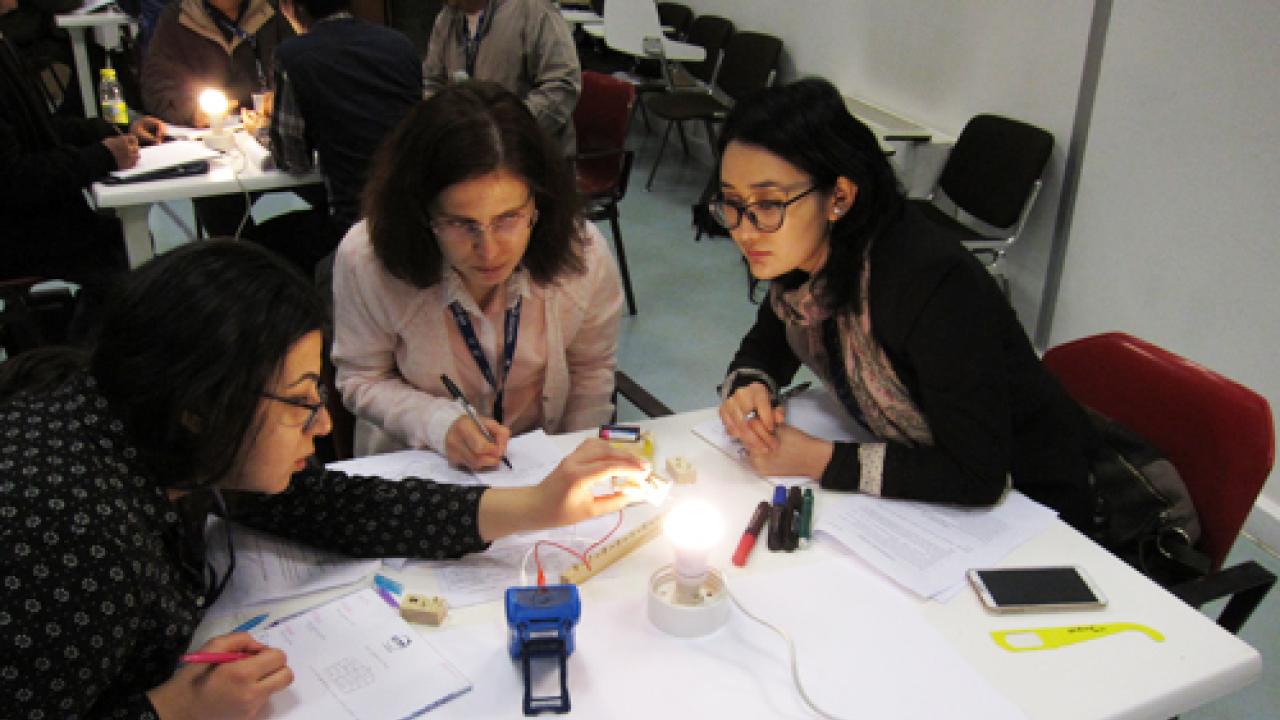
During a recent morning at ICTP, small groups of eager students could be seen in a classroom that had been adapted for hands-on physics experiments. At one table, students used markers to create a colourful schematic of a light-emitting diode (LED); at another workstation, students had energized a small LED with a set of batteries to investigate the lamp's electroluminescence.
In real life, these "students" are science teacher educators. They had descended on ICTP from throughout the developing world to learn about new, low-cost teaching methods and techniques that they can, in turn, pass on to science teachers in their home countries. Thanks to the yearly "Physware" workshop sponsored by ICTP, they and hundreds before them have gained valuable experience from some of the world's top science educators.
"The idea behind Physware is that teacher-participants share and work with prototypes of affordable, hands-on equipment that can be locally adapted for construction by teachers and their students throughout the developing world," says ICTP scientist Joseph Niemela, who has coordinated the activity since its inception in 2009.
The latest Physware workshop took place at ICTP from 25 to 30 January 2015 and was co-sponsored by the International Commission on Physics Education and the European Physical Society. In a nod to this year's UN-backed International Year of Light (with its secretariat based at ICTP), the training activities focussed on the use of LEDs, which lend themselves nicely not only to the themed year but also to Physware's low-cost philosophy.
Niemela explains that at the workshop, participants develop instructional materials, create construction plans, and gather ideas for activities to help them make effective use of the equipment in their home countries. The course serves to establish a primary network of outstanding physics teachers who can extend the knowledge of hands-on technologies locally.
The seeds for Physware were sown when organisers of the 2005 Durban World Conference on Physics and Sustainable Development (co-sponsored by ICTP) made physics education a main theme. The Centre followed up on conference recommendations to improve the training of physics teacher trainers. Thus, the physics training initiative Physware was born.
The 2015 edition of the workshop trained 24 attendees from 16 countries; overall reactions to the workshop were positive. Participant Raghavendra Maigur, a faculty member at the India Institute of Science, is part of a team that trains teachers in India. He says he came to the workshop for two reasons: "I was looking for simple experiments which can be taken to different schools and colleges, as well as methods where we can involve students in active learning. Both these goals have been met."
Another participant, Roxane Villanueva of the Philippines, conducts training activities for physics teachers in Mandaluyong City, and appreciated the hands-on methods taught by Physware. "I plan to introduce these methods to the teachers, as a way of doing the laboratory work we ask our students to do," she explains.
Joji Linaugo, also from the Philippines, says he likes Physware's inclusive style of teaching. "Everybody is participating and engaged," he notes, adding that the workshop's highlight on the role of women in physics and physics education "is what is needed now on gender and development."
Photos from the workshop are available in ICTP's Facebook page.
This year's Physware was co-organized by Gorazd Planinšič (University of Ljubljana, Slovenia) and Eugenia Etkina (Rutgers University, USA), with teaching support from Leos Dvořak and Irena Dvořakova (Charles University Prague, CZ).
















